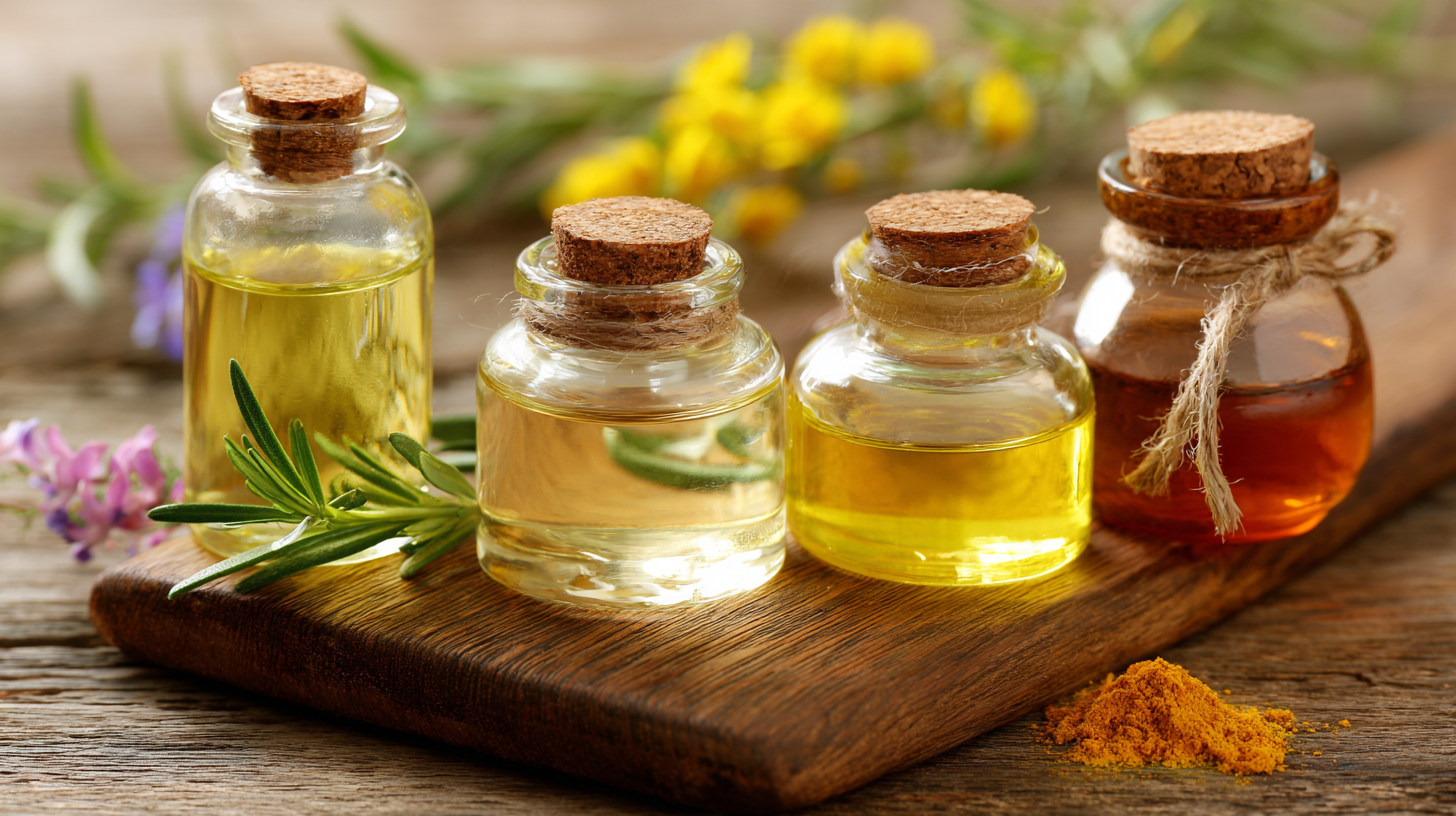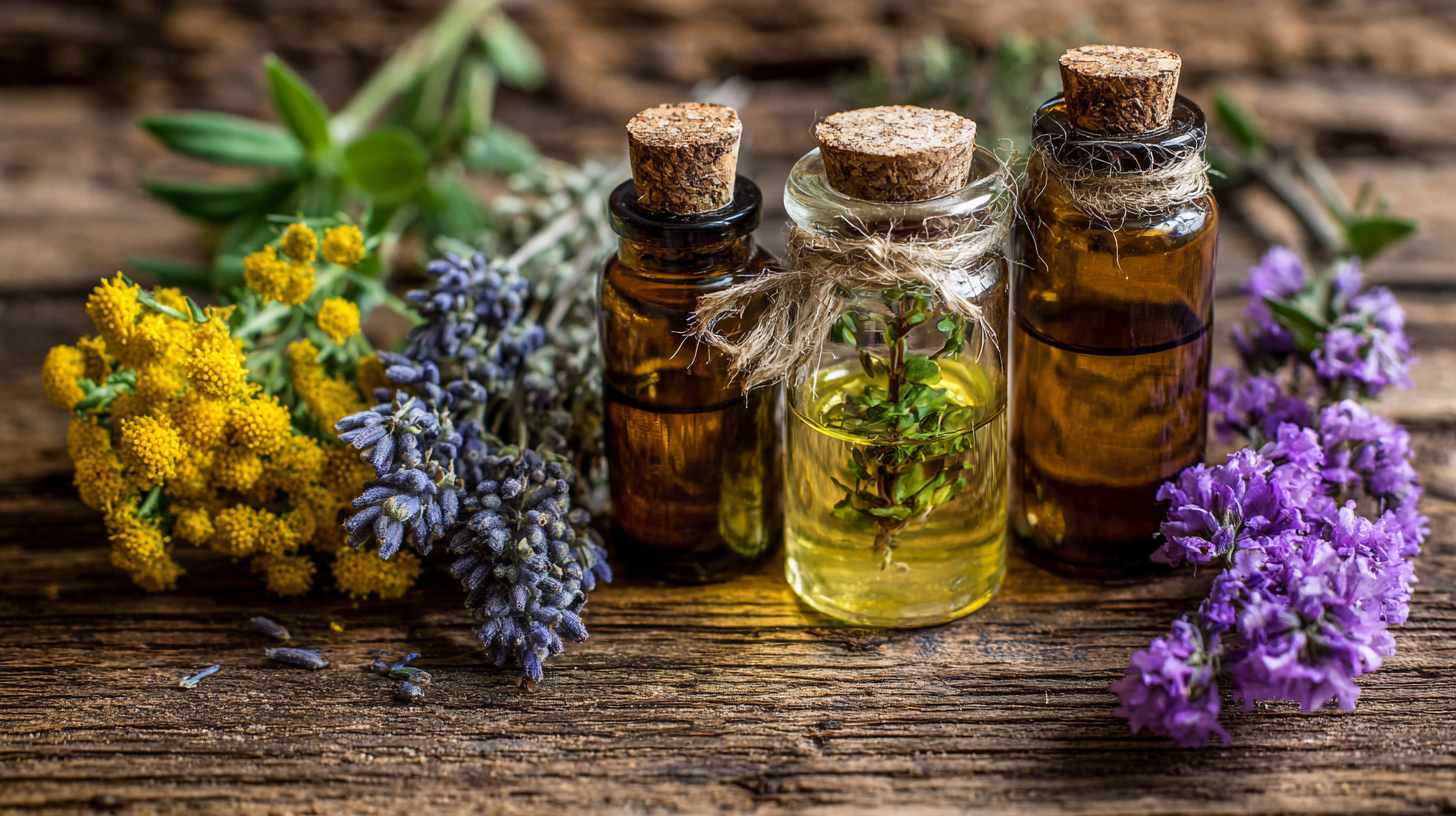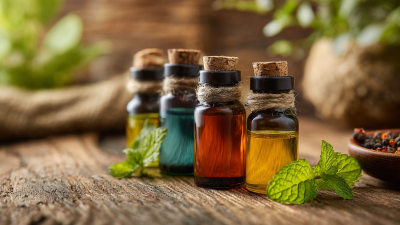Exploring Unique Alternatives to Anti Inflammatory Essential Oils for Natural Relief
Table of Contents
- Natural Herbs You Can Use to Combat Inflammation Effectively
- Creative Recipes to Incorporate Anti-Inflammatory Ingredients
- Lifestyle Changes That Promote a Natural Anti-Inflammatory Response
- Mindfulness and Relaxation Techniques to Alleviate Inflammation
- Alternative Supplements for Natural Inflammation Relief
- Superfoods That Help Reduce Inflammation in Your Diet
- FAQS
- Conclusion
- Related Posts
Lately, there's been a real buzz around natural remedies, especially when it comes to Anti-Inflammatory Essential Oils. You know, those oils are pretty popular because folks are discovering just how beneficial they can be. According to a recent report from Grand View Research, the global market for essential oils is expected to hit around USD 13.94 billion by 2028. A big part of this growth? People are leaning more towards plant-based options for health and beauty stuff. It’s not surprising—more and more of us are looking for safer, more natural solutions. Companies like Jiangxi Baicao Pharmaceutical Co., Ltd. are stepping up to the plate by creating a variety of natural flavor oils, plant-based essential oils, and herbal extracts, often sourced from local herbs like eucalyptus, peppermint, and tea tree. That said, while these Anti-Inflammatory Essential Oils are getting a lot of praise, some users do run into side effects or limitations. So, it’s definitely worth exploring other natural options for relief. In this blog, I’ll share some of those alternatives, talk about how effective they are, and why natural solutions are really gaining ground in today’s health-conscious world.

Natural Herbs You Can Use to Combat Inflammation Effectively
When you're looking to fight inflammation naturally, herbs really have your back. There are so many options that can be great alternatives to those traditional anti-inflammatory essential oils. Take turmeric, for example — it’s one of the most well-known herbs for this purpose, mainly because of its active compound, curcumin. This powerful stuff has been backed by scientific studies showing it can help reduce inflammation, and the best part is, it’s super easy to add into your everyday meals. You can toss it into teas, smoothies, or just sprinkle it into your cooking. Plus, that bright yellow color not only makes dishes look lively but also signals a healthier choice at the table.
Then there’s ginger — another superstar with pretty impressive anti-inflammatory properties. The key compounds in ginger, called gingerols, help by blocking certain pathways that lead to inflammation in the body. You can enjoy fresh ginger in teas, add it to soups, or even take it as a supplement if you prefer. Beyond turmeric and ginger, herbs like rosemary and boswellia also pack a punch when it comes to fighting inflammation. They can be used in all kinds of ways, from brewing teas to applying topically. Incorporating these natural options isn’t just about feeling better—it’s about embracing a more holistic, wellness-focused lifestyle. It’s pretty amazing how simple, natural remedies can make a real difference, right?

Creative Recipes to Incorporate Anti-Inflammatory Ingredients
Adding anti-inflammatory ingredients into your daily routine can actually be pretty enjoyable and good for your health. For instance, why not start your morning with a cozy turmeric latte? Just blend some almond milk with a teaspoon of turmeric, a pinch of black pepper, and a little honey—it's super soothing, warms you up, and gives your body a nice boost against inflammation. Plus, it’s a bit of a tasty twist on a classic drink and offers some real health perks.
And if you're feeling adventurous, try whipping up a ginger-infused salad dressing. Mix freshly grated ginger with olive oil, a splash of apple cider vinegar, a touch of maple syrup, and just a pinch of salt. It’s got this bright, zesty flavor that can really lift up any salad. Toss that over some greens with avocado and nuts, and suddenly, you’ve turned a simple meal into something hearty and nourishing—perfect if you're looking for a natural way to ease inflammation, no pills needed!
Lifestyle Changes That Promote a Natural Anti-Inflammatory Response
Making simple lifestyle tweaks can really boost your body's own ability to fight inflammation naturally. For starters, eating a diet full of colorful fruits, veggies, whole grains, and lean proteins is a solid foundation. Think berries, fatty fish like salmon, and leafy greens — these foods are loaded with antioxidants and omega-3s, which can help dial down inflammation. Try to fill your plate with a rainbow of colors whenever you can; it’s a good way to cover a broad range of nutrients without even thinking about it.
Getting moving regularly is just as key. Even 30 minutes of moderate exercise—like brisk walking, yoga, or biking—can make a difference. It gets your blood flowing and releases those helpful anti-inflammatory compounds in your body. Oh, and don’t forget about sleep—getting enough quality rest is super important because lack of sleep can make inflammation worse. Establishing a relaxing bedtime routine and making your bedroom cozy and quiet can really help you sleep better.
And honestly, managing stress is a game-changer. Practices like mindfulness meditation or just taking some deep breaths when you’re feeling overwhelmed can really help decrease inflammation caused by stress. Plus, doing things you love and spending time with friends or family can boost your mood and overall health. Little changes like these might seem small, but they can add up to a big difference for your well-being.
Mindfulness and Relaxation Techniques to Alleviate Inflammation
You know, mindfulness and relaxation techniques are really getting a lot of attention these days, and for good reason. Things like meditation or yoga can do wonders—your body switches into this relaxation mode, which is super important for fighting off stress and all its bad effects. When that happens, you're not just feeling calmer mentally, but your body actually produces fewer of those tricky inflammatory proteins, as some recent studies have pointed out. Programs like Mindfulness-Based Stress Reduction (MBSR) have shown pretty promising results, especially for folks dealing with conditions like rheumatoid arthritis. They find that it helps change how they perceive pain and gives them better tools to handle their symptoms.
But here’s the thing—practicing mindfulness regularly doesn’t just help you chill out. In the long run, it can reduce overall stress and even slow down some of the physical aging effects we all worry about. For people struggling with chronic pain or illnesses like ulcerative colitis, adding mindfulness into their routine can seriously make a difference in their quality of life. It’s really about cultivating that sense of being present and aware—it helps you manage stress better and, in turn, gives you a bit more control over your health. As more research keeps highlighting how tightly linked our minds and bodies are, exploring these kinds of practices seems like an awesome, natural way to find relief that’s worth trying out.
Exploring Unique Alternatives to Anti Inflammatory Essential Oils for Natural Relief - Mindfulness and Relaxation Techniques to Alleviate Inflammation
| Alternative Method | Description | Benefits | Recommended Practices |
|---|---|---|---|
| Yoga | A physical and mental practice combining breath control, meditation, and physical posture. | Reduces stress, enhances flexibility, and promotes relaxation. | Integrate a daily routine of at least 20 minutes of yoga. |
| Meditation | A mental exercise focusing on attention and awareness to achieve a mentally clear and emotionally calm state. | Lowers cortisol levels, decreases inflammation, improves mood. | Practice for 10-15 minutes daily in a quiet space. |
| Deep Breathing Exercises | Techniques to focus on inhalation and exhalation to promote relaxation. | Reduces stress and anxiety, increases oxygen flow. | Engage in deep breathing for 5 minutes during stressful situations. |
| Tai Chi | A form of martial arts known for its slow, deliberate movements and focus on breathing. | Improves balance, reduces stress, enhances overall wellbeing. | Incorporate a weekly class or practice at home. |
| Aromatherapy with Non-Essential Oils | Using non-essential oils like olive or coconut oil for relaxation and skin health. | Soothes discomfort and hydrates skin without irritation. | Use oils in massages or as part of a skincare routine. |
Alternative Supplements for Natural Inflammation Relief
When you're trying to manage inflammation naturally, lots of folks turn to essential oils. But honestly, there are quite a few other supplements that can really help out too. Take turmeric, for example—it's probably one of the most popular natural anti-inflammatories around, thanks to its active compound curcumin. Studies have shown that curcumin can actually lower those inflammatory markers in your body, so it’s a go-to for people wanting pain relief without reaching for synthetic drugs.
And then there's omega-3s, which you usually find in fish oil. These fatty acids are pretty effective because they actually block the production of inflammatory molecules, helping with chronic inflammation. If you're into plant-based stuff, flaxseed oil and chia seeds are fantastic sources of omega-3s—and they fit easily into your daily meals. Oh, and ginger! It’s been known for ages for its anti-inflammatory powers. You can enjoy it in teas, capsules, or fresh slices—it all helps with swelling and pain.
Basically, exploring these natural options broadens your toolkit for relief while also supporting overall health in a more holistic way. It’s all about finding what works best for you and keeping it simple.
Exploring Unique Alternatives to Anti-Inflammatory Essential Oils for Natural Relief
Superfoods That Help Reduce Inflammation in Your Diet
Hey, if you're looking for natural ways to fight inflammation, adding some superfoods to your diet can actually be a pretty effective alternative to relying solely on anti-inflammatory essential oils. For example, foods rich in omega-3s — like walnuts and flaxseeds — have been shown in studies to really help lower markers of inflammation in your body. I read in the *Journal of Nutritional Biochemistry* that people who eat more omega-3s tend to have lower levels of C-reactive protein (CRP), which is basically a sign that your body's fighting off inflammation.
But it's not just about omega-3s. Eating a rainbow of colorful fruits and vegetables packs your meals with antioxidants, which are super helpful when it comes to inflammation. Berries, in particular, seem to work wonders—research from the *American Journal of Clinical Nutrition* even found that snacking on berries daily can lead to noticeable drops in inflammatory markers. Pretty cool, right?
At Jiangxi Baicao Pharmaceutical Co., Ltd., we totally get how important natural remedies are. That’s why we offer a range of products like plant essential oils and herbal extracts—think eucalyptus and peppermint—all sourced from local ingredients. By combining these superfoods and herbal extracts in your daily routine, you’re really embracing a holistic approach to managing inflammation and soaking up the natural benefits along the way.

FAQS
: Mindfulness and relaxation techniques, such as meditation and yoga, help activate the body's relaxation response, which counters the negative effects of stress and diminishes the release of inflammatory proteins, thereby alleviating inflammation and enhancing overall well-being.
MBSR programs can alter pain perception and enhance coping mechanisms in individuals with chronic conditions like rheumatoid arthritis, providing them with better tools to manage their pain and stress.
Long-term mindfulness practice is linked to reduced stress levels and can help mitigate age-related effects on the body, ultimately improving quality of life for individuals managing chronic pain or other conditions.
Alternative supplements, such as turmeric and omega-3 fatty acids, offer significant relief by reducing inflammatory markers in the body, making them popular choices for managing inflammation naturally.
Turmeric, particularly its active compound curcumin, is known to help reduce levels of inflammatory markers in the body, providing a natural alternative for alleviating discomfort.
Flaxseed oil and chia seeds are excellent vegetarian sources of omega-3 fatty acids that can be easily incorporated into a daily diet to help diminish chronic inflammation.
Ginger is recognized for its anti-inflammatory properties and can be consumed in various forms, including teas or supplements, to help reduce swelling and pain.
Exploring alternative methods for managing inflammation, such as mindfulness practices and dietary supplements, expands options for natural relief and promotes a holistic approach to health.
Conclusion
Looking for natural ways to ease inflammation? You're not alone—more and more people are ditching traditional anti-inflammatory oils and exploring other herbal remedies. In this post, I’ll walk you through a bunch of natural herbs that are pretty amazing when it comes to reducing inflammation. Plus, I’ve got some tasty recipes so you can effortlessly add these goodies into your everyday meals. Sometimes, just making small lifestyle tweaks, taking a moment to be mindful, or trying out different supplements can really help your body become more anti-inflammatory naturally.
We’ll also talk about superfoods that pack a punch and can boost your overall health while fighting off inflammation. And here’s the cool part: at Jiangxi Baicao Pharmaceutical Co., Ltd., we’re all about high-quality natural flavor oils and herbal extracts—think eucalyptus and peppermint—that can boost your holistic approach. So, dive into these natural options and take charge of your health with simple, effective methods to reduce inflammation without the fuss.
Related Posts
-

Elevating Global Sales with China Made Premium Anti Inflammatory Essential Oils
-

Discover the Unmatched Quality of Chinese-Made Best Basil Essential Oil for Global Buyers
-

Unlocking the Secrets of Using Basil Essential Oil for Your Business Needs
-

Navigating Challenges in Sourcing High Quality Black Pepper Essential Oil for Global Markets
-

Exploring Unique Uses of the Best 100 Australian Tea Tree Oil: A Guide to Diverse Alternatives
-

Comparative Analysis of Top Cinnamon Oils for Treating Erectile Dysfunction

